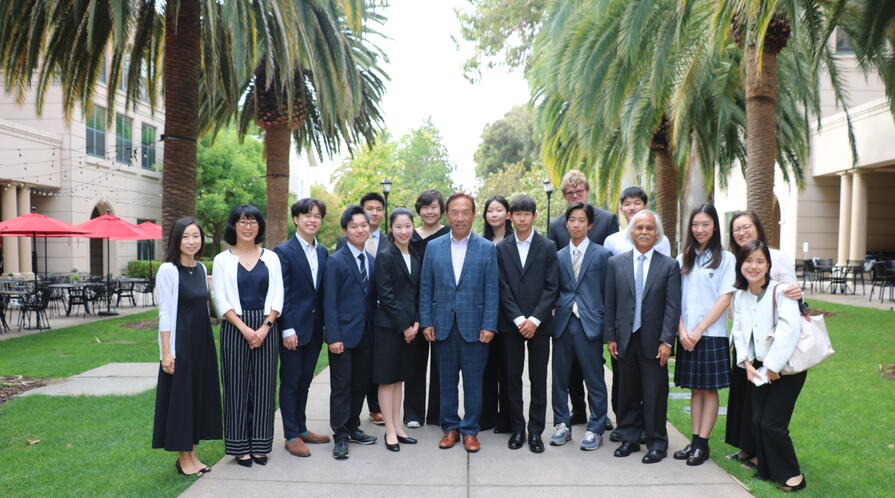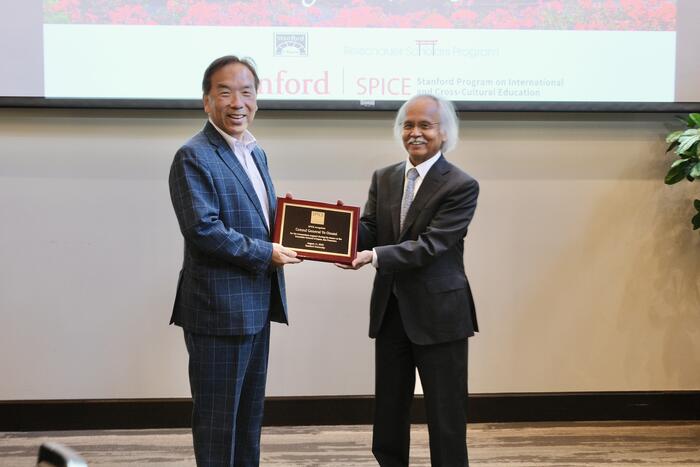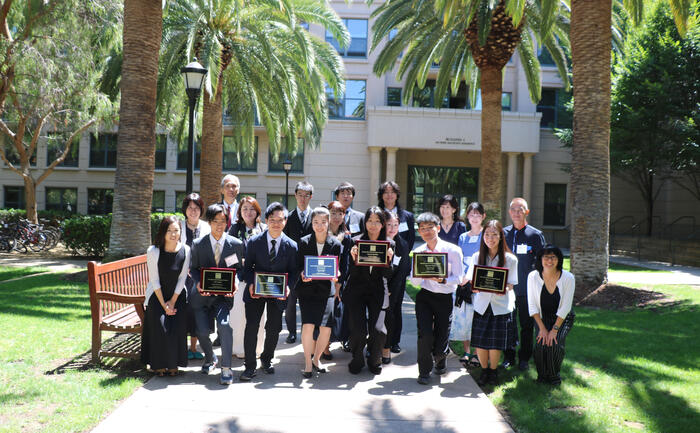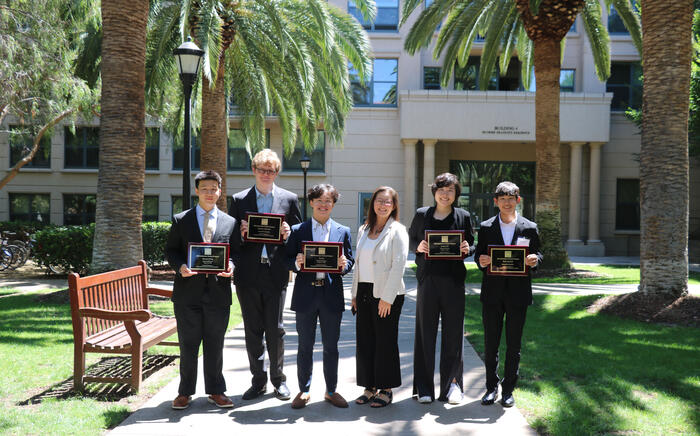Japan Day 2025: Recognizing the Highest Performing Students in Stanford e-Japan and the Reischauer Scholars Program
Japan Day 2025: Recognizing the Highest Performing Students in Stanford e-Japan and the Reischauer Scholars Program
91łÔąĎ instructors Waka Takahashi Brown, Naomi Funahashi, and Meiko Kotani recognize their student honorees.

Stanford e-Japan enrolls exceptional high school students from Japan to engage in an intensive study of U.S. society and culture. The Reischauer Scholars Program (RSP) enrolls exceptional high school students from the United States to engage in an intensive study of Japanese society and culture. Both courses underscore the importance of U.S.–Japan relations. is the current supporter of Stanford e-Japan, and the Japan Fund at the is the current supporter of the RSP.
On August 11, 2025, the 2025 Japan Day award ceremony was held at 91łÔąĎ to honor 91łÔąĎ’s Spring and Fall 2024 Stanford e-Japan student honorees and the 2025 RSP student honorees. The honorees performed at the highest levels of their courses as determined by Stanford e-Japan instructors Waka Takahashi Brown (spring course) and Meiko Kotani (fall course), RSP instructor Naomi Funahashi, and the research paper review committees. The honorees are:
Spring 2024 Stanford e-Japan
Aoi Furutani, Saitama Municipal Urawa High School, “Comparative Analysis of Surrogacy Policies in the United States and Japan: Proposals for Introducing Surrogacy in Japan”
Komari Machida, Crimson Global Academy, “Futoukou vs. Homeschooling: Exploring Societal Reintegration of Children Outside of Traditional School Systems in Japan and the United States”
Sota Tajima, Seiko Gakuin High School, “Synergy in the Stars: How the U.S. and Japan Can Lead the Next Era of Space”
Honorable Mentions:
Ryu Sato, Soka Senior High School, “Japanese and American Philanthropic Culture in Regard to College Financial Aid”
Sakura Suzuki, Hokkaido Asahikawa Higashi High School, “Designing School Buildings to Encourage Student Creativity: Comparing Historical Changes in School Buildings in Japan and the United States”
Fall 2024 Stanford e-Japan
Ellen Nema, Junior and Senior High School Affliiated to Showa Pharmaceutical University, “Breaking the Chain of Poverty in Okinawa: Educational Approaches and Foundations”
Hirotaka Onishi, Kaisei Gakuen High School, “A Time for Reconsideration: Toward a New International Monetary Order”
Mia Yakushiji, Murasakino Municipal High School, “Dual Citizenship in Japan”
Honorable Mentions:
Lynne Mizushima, Keio Shonan Fujisawa Junior & Senior High School, “The Lack of Female Political Leaders in Japan: A Cultural Glass Ceiling”
Kan Sugimi, Isahaya High School, “Should Bilingual Parents in the U.S. Raise Bilingual Children?”
2025 Reischauer Scholars Program
Bennett Feng, Horace Mann School, “From Economic Rebirth to Structural Stagnation”
Jessica Hu, The Harker School, “Dried-Up Rivers: State-Sponsored Linguistic Oppression and Its Erasure of Ainu Identity”
Ty Tan, Coral Academy of Science Las Vegas, “Recalibrating Japan’s FOIP”
Honorable Mentions:
Jackson Hayward, The Nueva School, “Shikata ga nai: Voter Apathy and Cultural Depoliticization in Modern Japan”
Radoslav Kyselak, Highland Hall Waldorf School, “Norms Through Networks: Japan’s Digital Diplomacy as a Counter to China’s Digital Silk Road in the Global South”

The program began with welcoming comments from the Honorable Yo Osumi, Consul General of Japan in San Francisco. He commented that the Reischauer Scholars Program and Stanford e-Japan are very important for our two nations—given that both engage future leaders in both countries—and extended high praise to the honorees. Consul General Osumi’s tenure ended at the end of August and on behalf of my colleagues at 91łÔąĎ, I presented him with a plaque from 91łÔąĎ to acknowledge his unwavering support of 91łÔąĎ’s Japan programs.


Following the welcoming and opening comments, Brown, Kotani, and Funahashi gave overviews of their courses and introduced the student honorees. The student honorees made engaging presentations based on their research papers and fielded very thought-provoking questions from the audience. Each honoree received a plaque from their instructor. The photo on the top is of the Stanford e-Japan honorees, and the photo on the bottom is of the RSP honorees; photo credit: Irene Bryant.
The RSP will enter its 23rd year in 2026, and Stanford e-Japan is about to enter its 11th year. Many of the alumni are studying U.S.–Japan relations, engaged in various fields related to U.S.–Japan relations, and continue to give back to both programs by being guest speakers and mentors to the new students.
Following the formal event, the student honorees—most having just met each other in person for the first time—had the chance to enjoy a Stanford campus tour together. It is the hope of Brown, Kotani, and Funahashi that the Japanese and American student honorees will continue to strengthen their budding friendships and ensure that the U.S.–Japan relationship remains strong.
91łÔąĎ is grateful to President Tadashi Yanai for his generous support of Stanford e-Japan and to the staff of the Yanai Tadashi Foundation for their regular correspondence and encouragement. 91łÔąĎ is thankful to the Japan Fund committee at FSI for its generous support of the Reischauer Scholars Program. These courses and the ceremony would not be possible without them. 91łÔąĎ is also grateful to 91łÔąĎ Event Coordinator Sabrina Ishimatsu for meticulously planning and implementing the event.
91łÔąĎ is currently accepting applications for the 2026 Reischauer Scholars Program. The deadline to apply is October 17, 2025.
The application for the 2026 session of Stanford e-Japan will open on November 15, 2025.
91łÔąĎ also offers online courses to U.S. high school students on China (China Scholars Program), Korea (Sejong Korea Scholars Program), and entrepreneurship (Stanford e-Entrepreneurship U.S.), to Chinese high school students on the United States (Stanford e-China), and to Japanese high school students on entrepreneurship (Stanford e-Entrepreneurship Japan).
To stay informed of 91łÔąĎ news, and follow us on , , and .



